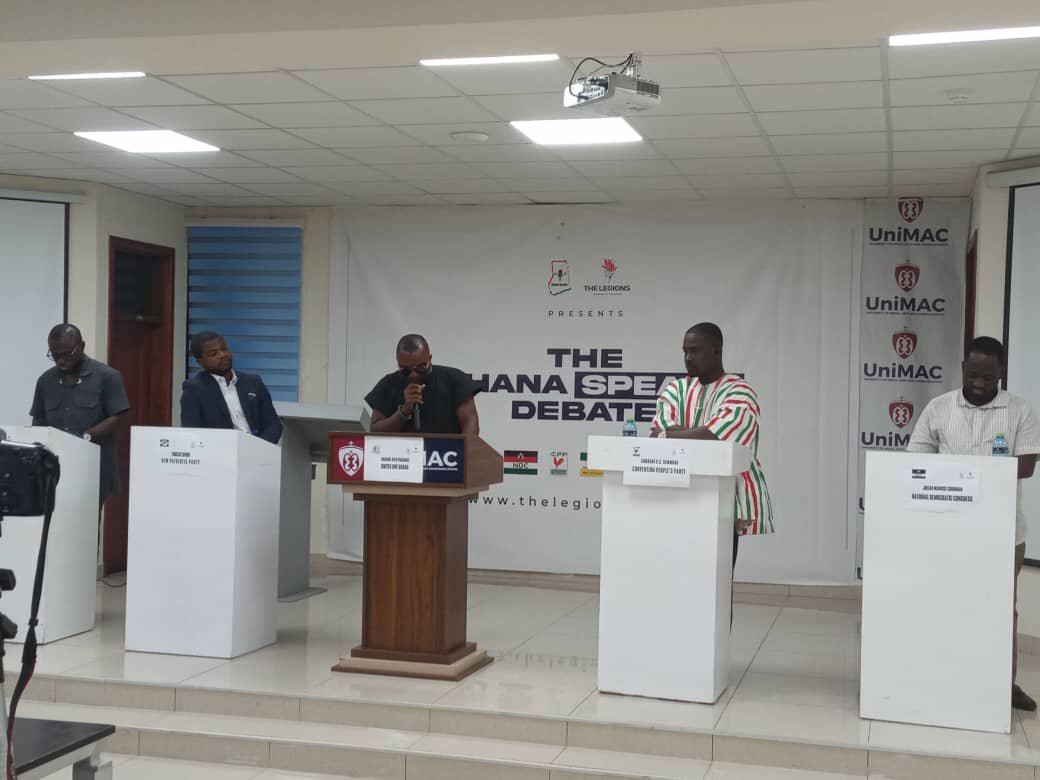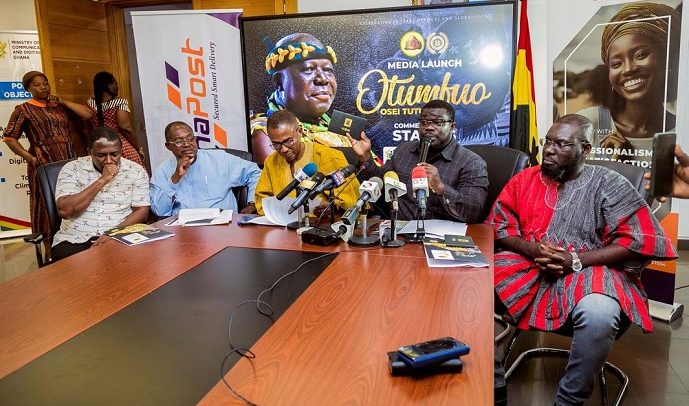
Two significant events took place in Ghana outside the corridors of political power in November 2025. The first was the historic visit of Mr. Frank-Walter Steinmeier, the President of the Federal Republic of Germany to the Asantehene, Otumfuo Osei Tutu II at the Manhyia Palace in Kumasi.

Described as the first of its kind the visit aimed at strengthening the relationship between Germany and the Asante Kingdom. I learnt that the discussions centred on investment opportunities and the potential of creating employment opportunities for the youth. It is worth noting that future of employment opportunities could benefit all Ghanaian youth irrespective of social, ethnic and religious backgrounds.
The highlights of the meeting were the exchange of ideas and plans for collaboration and strengthening diplomatic bond between Germany and Ghana. As a symbolic gesture the two top dignitaries exchanged gifts. While the German President presented Asantehene with a Golf bag, to symbolize their shared interests in the game, the Asantehene gave the German President a beautiful traditional stool adorned with the Asanteman emblem, to depict a symbol of unity and friendship between them.
Support for TVET
Later President Frank-Walter cut a sod for a construction of a TVET facility at the Kumasi Technical Institute (KTI) to enhance the practical training of Ghanaian youth in technical and vocational training. The facility was initiated by the government of Ghana with funding support of five million Euros from Germany, under the Ghana-German Financial Cooperation. This facility could also benefit all Ghanaian youth who are interested in acquiring TVET education. As a country whose economy thrives on TVET innovation, Germany is the best country to technological transfer in TVET to Ghana.
Germany hosts one of the largest population of Ghanaians in Europe, with Ashantis being the largest group. Recent estimates claim that approximately 100,000 Ghanaians live in Germany, with 40,000 of them residing in Hamburg alone. It therefore made diplomatic sense for the German President to visit Ghana to deepen the cultural and economic ties between the friendly countries and their people.
Hate campaign
Rather than rejoicing over such a beneficial visit, it could resurrect the hate campaign some chiefs are waging against the status of Asantehene and his kingdom. In the run up to the 2024 election, a particular paramount chief in the Bono Region started a hate campaign against the occupant of the Golden stool on social media. He categorically complained that the Asantehene was receiving too much national and international attention, and that there cannot be one king in Ghana as captured in the 1992 Constitution.
Besides, raising political temperature in Ghana, perhaps, the anti-Asantehene agenda was to whip up ethnic sentiments and to trigger a constitutional amendment to designate other chiefs as kings in the constitution. The fact is that Dagomabs, Gonjas, Mamprushis, the Akyems, Akwapems, Denkyiras among others see their overlords as kings and treat them as such. To Gonjas, Dagombas and Mamprushis the Yagbonwura, the Yaa Naa and the Nayiri are kings in their own rights; so, they do not need constitutional recognition to portray and revere their overlords as kings.
All the noise about Asantehene’s status was calculated for political gain. In this modern era when chiefs are expected to be catalysts for change and providing direction to their people, it is worthless for one chief to use social media to rant and rave about Asantehene’s constitutional status.
Like him or hate him, the Asantehene is historically Ghana’s most visible and iconic brand Ambassador, both locally and globally. While some chiefs and their people are engaged in wasteful effort to denigrate his status, the Caribbean countries uphold him as their brand and tourism icon.
Visit to the Caribbeans
On the heels of the German’s President’s visit, the Asantehene visited some Caribbean in the second week of November 2025. Like his previous visits, Asantehene’s recent visit was significant for deepening cultural and economic ties between Africa and the Caribbean. The Asantehene was the Special Guest of Honour at this year’s GUBA (Grow, Unite, Build, Africa) Awards.
The GUBA Awards are a series of Pan-African and diaspora business and innovation awards that celebrate excellence in business, leadership, arts, and culture. Founded by British-Ghanaian entrepreneur Dentaa Amoateng in 2009, the awards were initially created to recognize the contributions of British-Ghanaians and have since expanded to honor individuals and organizations across the African diaspora for their positive impact and contributions to communities
Asantehene’s visit highlighted the shared heritage among Africans and Africans in the Diaspora, where he advocated for concrete actions like a direct flight, educational exchanges, and cultural collaborations to strengthen the relationship.
Key aspects of the visit:
- Strengthening ties: The visit aimed to cement the historical and cultural connections between Ghana and the Caribbean, which were emphasized during meetings with leaders like the Prime Minister of Barbados, Mia Amor Mottley.
- Economic cooperation: The Asantehene advocated greater economic cooperation, direct trade and joint economic ventures between Africa and the Caribbean.
- Cultural and educational exchange: The visit promoted cultural collaboration through partnerships between arts and creative industries. It also recommended using educational institutions to foster a deeper understanding of shared history, suggesting exchange programs and curriculum development.
- Direct flights: A significant push was made for the establishment of direct flights between Africa and the Caribbean to ease travel and increase exchanges, improve people-to-people connections and a unified economic front between the two regions.
In a statement shared on social media, Prime Minister, Honourable Mia Amor Mottley described the meeting as “an honour,” noting that their discussion reflected “the deep historical and cultural bonds that connect Barbados, the wider Caribbean, and Ghana. These ties are rooted in shared heritage and strengthened by mutual purpose.”
The Prime Minister added that their conversation also focused on the future, exploring ways to deepen cooperation and create new opportunities between the regions.
Asantehene’s response
In an insightful and expertly presented speech, the Asantehene, recalled that his past and present visit aimed at helping to broaden and cement the growing relations between Africa and the Caribbeans. He explained that in a previous visit to Holland, a young Surinamese lady asked him a thought-provoking question about the Trans-Atlantic slave trade.
She asked “why did you sell us to the slave masters, why did you abandon us? In response, the Asantehene said, “let me be honest with you, “As I speak to you now, we are still being manipulated by the west after 400 years, our forefathers did not know much, they were lured into selling their own people. After 400 years, they are still manipulating us and that is why we must sit up and begin to manage our affairs”, he advised.
Furthermore, the Asantehene explained that although the Trans-Atlantic Slave Trade dispersed Africans across the world, it has become a bridge that connects Africans to Africans in the Diaspora, making us a global African family.” He was optimistic that crossing the Atlantic Ocean will help to rebuild the destiny of Africa. “But to succeed, in doing this we need to free ourselves from mental slavery that has conditioned us to always accept thoughts of inferiority”, he pointed out.
According to him, the significant step among Africans and their siblings in the Diaspora is to reconnect and break what divided people of African descent for centuries. He recalled that some famous freedom fighters like Marcus Garvey, Malcom X and Marthin Luther King (Jr) advocated for a reconnection among all people of African ancestry to promote socio-political and economic cooperation and collaboration.
African Union
In that regard, he recalled that in 2006, the Africa Union Heads of State amended the Constitutive Act of AU to include the Africa Diaspora as the sixth region of Africa, the rest being West Africa, East Africa, North Africa, South Africa and Central Africa. “You should, therefore, embrace and promote Africa Liberation Day of May 25 in the Caribbean, while Africans should celebrate the Emancipation Day of the Caribbeans on August 1 each year.”
The Asantehene challenged his audience in Barbados to, “let your Africanness not be a source of shame, but a badge of pride and honour, which you should always wear or display.” He expressed joy that Africa is now implementing a continental free trade regime; and explained that the continental free trade treaty has the power to reorganize Africa’s trade and equip African states with strong negotiating power in bilateral negotiations. “Let us seize this glorious opportunity to work together and support each other for a prosperous future.”
In addition, the Asantehene philosophized that God determines who becomes our brothers and sisters, but we have been given the right to choose our friends. “You and I have no control over who becomes our relatives, that is God’s right, but we have the latitude to decide who are our friends and associates”, he stressed.
King Eswatini’s visit
Earlier in the year King Mswati III of Eswatini visited the Asantehene, Otumfuo Osei Tutu II at Manhyia, in what turned out to be an impressive cultural exchange in recent memory. Like the visit of the German President, King Mswati’s visit strengthened the historical and cultural bonds between the two kingdoms. It symbolized unity and reaffirmed the important role of traditional leadership in contemporary Africa. Moreover, it fostered mutual understanding and created a forum for future cooperation in culture, governance and economic development. Below is a summary of additional highlights:
Showcasing African royalty and unity
- The event was a powerful demonstration of African royalty, with events like a grand durbar of chiefs and a royal banquet at Manhyia Palace showcasing the cultural richness of both kingdoms.
- It presented a united front for African leadership, sending a powerful message of unity and purpose on the continent, as well as and emphasizing the enduring solidarity among African royal houses.
Strengthening cultural and diplomatic ties
- The visit was a historic interaction between two of Africa’s most revered traditional leaders, reinforcing the historical legacy and cultural heritage that Asante and Eswatini share.
- Both monarchs emphasized a renewed commitment to friendship and solidarity, highlighting the visit as a reaffirmation of an “unbroken brotherhood” between their peoples.
- The exchange of gifts, such as the symbolic “tontonsansan” and unity staff, further cemented the respect and goodwill between the two monarchies.
Fostering collaboration and development
- The monarchs discussed the role of traditional leadership in modern society and explored avenues for future collaboration on development and inter-kingdom cooperation.
- Areas of future collaboration included agricultural revolution, science and technology, and managing natural resources for the prosperity of the continent.
The three events, no doubt enhanced the brand of Ghana in the minds and eyes of the global community, who watched them on television and social media. The investment opportunities discussed between the German President and the Asantehene would benefit all Ghanaians and not only the Ashantis.
For these cogent reasons, Asantehene’s fame and brand makes a strong case for Ghanaians to revere the Golden Stool as a national symbol for the country. On the contrary the chiefs who have turned themselves into social media comedians have nothing to offer the brand of Ghana. They will sink into oblivion and be remembered as rabblerousers, instead of agents of positive change for their people.
The post Development Discourse with Amos Safo: Asantehene is the most significant brand icon appeared first on The Business & Financial Times.
Read Full Story



















Facebook
Twitter
Pinterest
Instagram
Google+
YouTube
LinkedIn
RSS